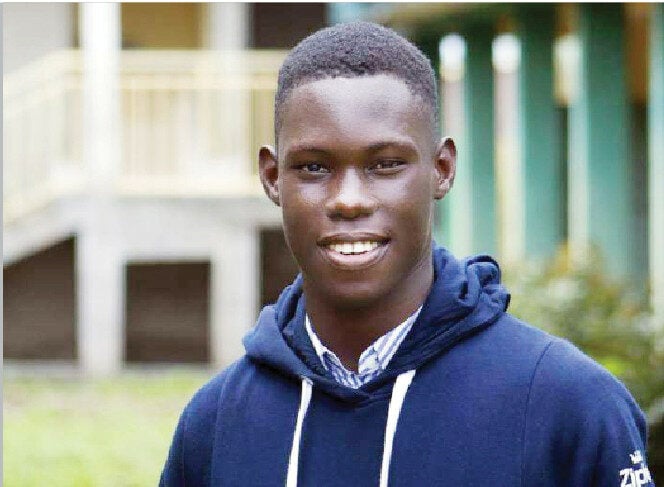David Adeyemi represents a new generation of Nigerian youth whose innovation, empathy and brilliance are shaping the future of technology for social good. A student of Covenant University, he has distinguished himself nationally and internationally for developing an artificial intelligence-driven educational accessibility app that transforms learning for blind and low-vision students.
At a time Nigeria’s youth population is redefining innovation and civic engagement, Adeyemi’s creation, an assistive digital platform that converts materials into accessible formats in real time, has redefined inclusion in society. With features such as text-to-speech narration, voice-command navigation, high-contrast and large-type interfaces, and offline capability, the app enables blind and partially sighted students to study independently, participate in lectures seamlessly, and access learning materials without barriers.
For Adeyemi, technology is not merely about convenience; it is a tool for empowerment. His innovation was borne out of observation and empathy after volunteering as a teaching assistant for visually impaired learners in secondary schools. Witnessing their daily struggles with inaccessible course materials and limited support systems, he decided to leverage his skills in artificial intelligence, natural language processing, and human-centred design to craft a solution that restores autonomy and dignity to learning.
Through his work, Adeyemi demonstrates that innovation is most powerful when it serves humanity. His app, now being piloted across several tertiary institutions, provides not only academic access but also social inclusion, helping visually impaired students to interact more confidently in classrooms and digital environments. In this sense, his contribution is both technological and humanitarian: it bridges gaps, expands opportunity and challenges stereotypes about disability and capability.
Adeyemi’s journey shows a blend of technical ingenuity and purpose-driven leadership. Trained in Computer Science at Covenant University, he had early fascination with algorithms, which evolved into a passion for using artificial intelligence to solve human problems.
He founded a campus-based innovation circle that mentors students in building socially relevant digital tools, encouraging peers to see technology not as a luxury but as leverage for national development. Under his leadership, this group has produced prototypes for inclusive education, mental health support and agricultural data analytics, showcasing the depth of creativity emerging from Nigerian universities.
Adeyemi’s influence among his peers underscores his capacity for leadership rooted in service and shared growth. He is not only building technology; he is building people.
His app’s development journey mirrors the resilience and problem-solving mindset that characterise many young Nigerian innovators. With limited funding, Adeyemi taught himself to integrate open-source AI models, streamline mobile architecture for low-end devices, and ensure offline operation, a critical feature for campuses with poor connectivity.
In recognition of his work, Adeyemi has received commendations from education technology networks, including the Nigeria Academy of Pharmacy, for translating empathy into impact. He was also a finalist in the African Union’s Innovating Education in Africa (IEA) challenge, where his solution was cited as a model for accessible education in low-resource settings.
Beyond awards, Adeyemi remains grounded in his mission, ensuring that every learner, regardless of disability, can access knowledge on equal terms. His approach mirrors the global shift toward inclusive design, where technology adapts to human diversity rather than the other way around.
His initiative aligns with the United Nations Sustainable Development Goals, particularly SDG 4 (Quality Education) and SDG 10 (Reduced Inequalities), demonstrating that local solutions can address global challenges.
Adeyemi’s impact also extends into digital policy advocacy. He has participated in stakeholder consultations on education technology and contributed to policy briefs recommending the integration of assistive technology in Nigeria’s tertiary institutions. His blend of technical expertise and social vision makes him a model of the modern Nigerian change maker – driven, ethical, and globally relevant.
As he continues to refine his accessibility platform and explore its scalability across African universities, he envisions a future where learning is universally accessible. He plans to establish a non-profit technology hub dedicated to inclusive innovations, supporting developers who work on solutions for persons with disabilities.
He believes that every challenge is a call to create something better. This philosophy, rooted in empathy, excellence and service, guides his work and defines his generation’s contribution to nation-building.
His story is a reminder that innovation does not require privilege, only purpose. By using code to break barriers and AI to give voice to the unheard, David Adeyemi exemplifies the transformative power of youth innovation in Africa’s digital century.
The LEADERSHIP Outstanding Young Person of the Year 2025 Award celebrates David Adeyemi for his groundbreaking use of artificial intelligence to democratise education for visually impaired learners. His creation embodies the spirit of inclusive innovation, blending technology with humanity to foster dignity, equality and opportunity. In recognising him, we honour not just a brilliant young innovator but a symbol of what Nigeria’s youth can achieve when purpose meets perseverance. His achievement reaffirms the power of vision, empathy and intellect to change lives and reshape society.
For his commitment to building an inclusive learning ecosystem and for exemplifying the ideals of innovation with social conscience, David Adeyemi is named the LEADERSHIP Outstanding Young Person of the Year 2025.





